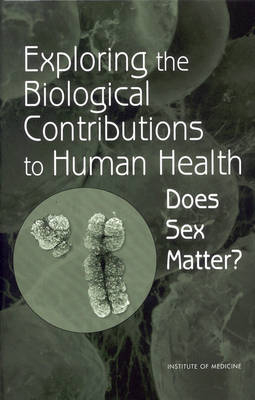
Exploring the Biological Contributions to Human Health
Does Sex Matter?
Seiten
2001
National Academies Press (Verlag)
978-0-309-07281-6 (ISBN)
National Academies Press (Verlag)
978-0-309-07281-6 (ISBN)
Discusses basic biochemical differences in the cells of males and females and health variability between the sexes from conception throughout life. This book identifies key research needs and opportunities and addresses barriers to research. It is useful to health policy makers, basic, applied, and clinical researchers, educators, and providers.
It's obvious why only men develop prostate cancer and why only women get ovarian cancer. But it is not obvious why women are more likely to recover language ability after a stroke than men or why women are more apt to develop autoimmune diseases such as lupus.
Sex differences in health throughout the lifespan have been documented. Exploring the Biological Contributions to Human Health begins to snap the pieces of the puzzle into place so that this knowledge can be used to improve health for both sexes. From behavior and cognition to metabolism and response to chemicals and infectious organisms, this book explores the health impact of sex (being male or female, according to reproductive organs and chromosomes) and gender (one's sense of self as male or female in society).
Exploring the Biological Contributions to Human Health discusses basic biochemical differences in the cells of males and females and health variability between the sexes from conception throughout life. The book identifies key research needs and opportunities and addresses barriers to research.
Exploring the Biological Contributions to Human Health will be important to health policy makers, basic, applied, and clinical researchers, educators, providers, and journalists-while being very accessible to interested lay readers.
Table of Contents
Front Matter
Executive Summary
1 Introduction
2 Every Cell Has a Sex
3 Sex Begins in the Womb
4 Sex Affects Behavior and Perception
5 Sex Affects Health
6 The Future of Research on Biological Sex Differences: Challenges and Opportunities
References
Appendix A: Data Sources and Acknowledgments
Appendix B: Physiological and Pharmacological Differences Between the Sexes
Appendix C: Glossary
Appendix D: Committee and Staff Biographies
Index
It's obvious why only men develop prostate cancer and why only women get ovarian cancer. But it is not obvious why women are more likely to recover language ability after a stroke than men or why women are more apt to develop autoimmune diseases such as lupus.
Sex differences in health throughout the lifespan have been documented. Exploring the Biological Contributions to Human Health begins to snap the pieces of the puzzle into place so that this knowledge can be used to improve health for both sexes. From behavior and cognition to metabolism and response to chemicals and infectious organisms, this book explores the health impact of sex (being male or female, according to reproductive organs and chromosomes) and gender (one's sense of self as male or female in society).
Exploring the Biological Contributions to Human Health discusses basic biochemical differences in the cells of males and females and health variability between the sexes from conception throughout life. The book identifies key research needs and opportunities and addresses barriers to research.
Exploring the Biological Contributions to Human Health will be important to health policy makers, basic, applied, and clinical researchers, educators, providers, and journalists-while being very accessible to interested lay readers.
Table of Contents
Front Matter
Executive Summary
1 Introduction
2 Every Cell Has a Sex
3 Sex Begins in the Womb
4 Sex Affects Behavior and Perception
5 Sex Affects Health
6 The Future of Research on Biological Sex Differences: Challenges and Opportunities
References
Appendix A: Data Sources and Acknowledgments
Appendix B: Physiological and Pharmacological Differences Between the Sexes
Appendix C: Glossary
Appendix D: Committee and Staff Biographies
Index
Theresa M. Wizemann and Mary-Lou Pardue, Editors, Committee on Understanding the Biology of Sex and Gender Differences, Board on Health Sciences Policy
1 Front Matter; 2 Executive Summary; 3 1 Introduction; 4 2 Every Cell Has a Sex; 5 3 Sex Begins in the Womb; 6 4 Sex Affects Behavior and Perception; 7 5 Sex Affects Health; 8 6 The Future of Research on Biological Sex Differences: Challenges and Opportunities; 9 References; 10 Appendix A: Data Sources and Acknowledgments; 11 Appendix B: Physiological and Pharmacological Differences Between the Sexes; 12 Appendix C: Glossary; 13 Appendix D: Committee and Staff Biographies; 14 Index
| Erscheint lt. Verlag | 2.8.2001 |
|---|---|
| Verlagsort | Washington |
| Sprache | englisch |
| Maße | 152 x 229 mm |
| Themenwelt | Studium ► 1. Studienabschnitt (Vorklinik) ► Histologie / Embryologie |
| Studium ► Querschnittsbereiche ► Prävention / Gesundheitsförderung | |
| Sozialwissenschaften ► Soziologie ► Gender Studies | |
| ISBN-10 | 0-309-07281-6 / 0309072816 |
| ISBN-13 | 978-0-309-07281-6 / 9780309072816 |
| Zustand | Neuware |
| Haben Sie eine Frage zum Produkt? |
Mehr entdecken
aus dem Bereich
aus dem Bereich
Zytologie, Histologie und mikroskopische Anatomie
Buch | Hardcover (2022)
Urban & Fischer in Elsevier (Verlag)
54,00 €
Gewebelehre, Organlehre
Buch | Spiralbindung (2024)
Urban & Fischer in Elsevier (Verlag)
25,00 €


